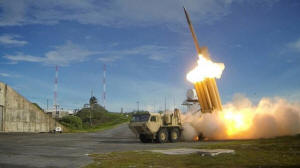|
China sees THAAD deployment as 'weather
vane' under Trump
 Send a link to a friend
Send a link to a friend
 [November 17, 2016]
By Benjamin Kang Lim and Kevin Yao [November 17, 2016]
By Benjamin Kang Lim and Kevin Yao
BEIJING (Reuters) - Whether President-elect
Donald Trump goes through with a deployment of a U.S. anti-missile
system in South Korea will be a key indicator to how political ties
unfold with China, sources with ties to the leadership in Beijing said.
Beijing will also be keeping a close eye on Trump's meeting on Thursday
with Prime Minister Shinzo Abe of Japan, its key regional rival, for
clues on how the President-elect, who has never held public office, is
likely to conduct foreign policy, they said.
South Korea and the United States have agreed to deploy a Terminal High
Altitude Area Defence (THAAD) anti-missile system to counter missile
threats from North Korea. It is expected to be in place within eight to
10 months, the commander of U.S. forces in South Korea said earlier this
month.
China has argued the planned deployment undermines strategic stability
in Northeast Asia, and worries that THAAD's powerful radar provides
coverage of China's missile installations.
"Whether deployment of the Terminal High Altitude Area Defense is
delayed is a political weather vane," one source said.
A security adviser to Trump said last week his meeting in New York with
Abe on Thursday may mark the start of talks to garner Tokyo's support
for a push-back against China's growing influence in Asia.

"We have heard what he said. We will now watch what he does," said the
source, requesting anonymity because he is not authorized to speak to
media.
"We will play it by ear," the source said, invoking an idiom that
translates to blocking a punch or a kick as it comes.
DOUBT OVER ALLIANCES
Trump has created doubts over his commitment to security alliances with
Japan and South Korea, suggesting they need to pay more for a U.S.
military presence and even hinting they should develop their own nuclear
weapons capability.
Japan going nuclear would be China's worst nightmare and is likely to
provoke strong reaction, diplomats and analysts have said.
China's relations with Japan have long been poisoned by what Beijing
sees as Tokyo's failure to fully atone for its invasion and occupation
of parts of China before and during World War Two as well as competing
claims over a group of East China Sea islets.
"Northeast Asia would be a powder keg," a second source said, referring
to a nuclearized sub-region including China, Japan, North and South
Korea.
The State Council Information Office, or cabinet spokesman's office, had
no immediate comment.
China is generally opposed to military alliances, seeing them as Cold
War relics.
FLUID TIES
China's stability-obsessed leaders do not know what to make of the
70-year-old Trump, whose win over Hillary Clinton was unexpected, and
has backpedaled on some of his more controversial campaign statements.
[to top of second column] |

A Terminal High Altitude Area Defense (THAAD) interceptor is
launched during a successful intercept test, in this undated handout
photo provided by the U.S. Department of Defense, Missile Defense
Agency. U.S. Department of Defense, Missile Defense Agency/Handout
via Reuters/File Photo

For example, Trump pledged his commitment to defending South Korea
under an existing security alliance during a phone call last week
with South Korean President Park Geun-hye. Trump had said during the
election campaign he would be willing to withdraw the 28,500 U.S.
troops stationed in South Korea unless Seoul paid a greater share of
the cost of the U.S. deployment.
Trump told Reuters in an interview in May he was willing to talk to
North Korean leader Kim Jong Un to try to stop Pyongyang's nuclear
program - a major shift in U.S. policy toward the isolated nation -
but has also called for China to do more to rein in Pyongyang.
Sino-U.S. relations after Trump takes office on Jan. 20 are expected
to be fluid, although Chinese President Xi Jinping told Trump during
a telephone call on Monday cooperation was the "only correct choice"
for the two giants.
A statement from Trump's presidential transition office said the two
men "established a clear sense of mutual respect for one another"
and he believes the two countries will have one of the strongest
relationships moving forward.
Trump's election does offer some good news for China: it signals the
demise of the U.S.-led Trans-Pacific Partnership (TPP), which
excludes China; it raises the possibility of belated U.S. backing
for the China-led Asian Infrastructure Investment Bank, and possibly
marks an end to President Obama's strategic "pivot" to Asia.
The bad news is that Trump has often made provocative remarks about
China during his campaign, including threats to slap 45 percent
tariffs on imports from China and label the world's second-biggest
economy a currency manipulator.
Wei Jianguo, a retired vice commerce minister, was optimistic a
trade war could be avoided.

"Protectionism is on the rise, but a trade war between China and the
United States is unlikely," Wei, vice chairman of the China Center
for International Economic Exchanges, a government-backed
think-tank, told Reuters.
"That was just election rhetoric," he said.
(Additional reporting by Michael Martina; Editing by Tony Munroe and
Bill Tarrant)
[© 2016 Thomson Reuters. All rights
reserved.]
Copyright 2016 Reuters. All rights reserved. This material may not be published,
broadcast, rewritten or redistributed. |